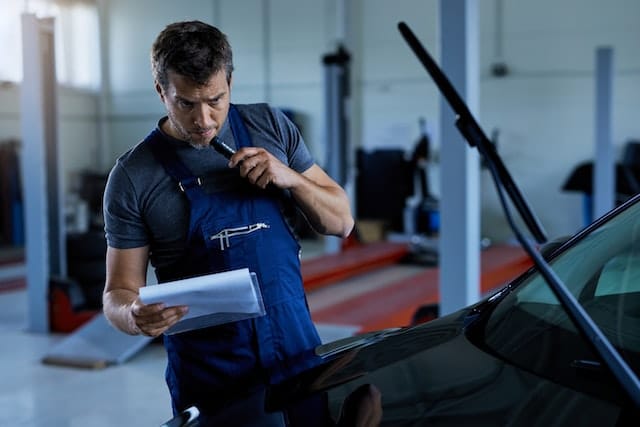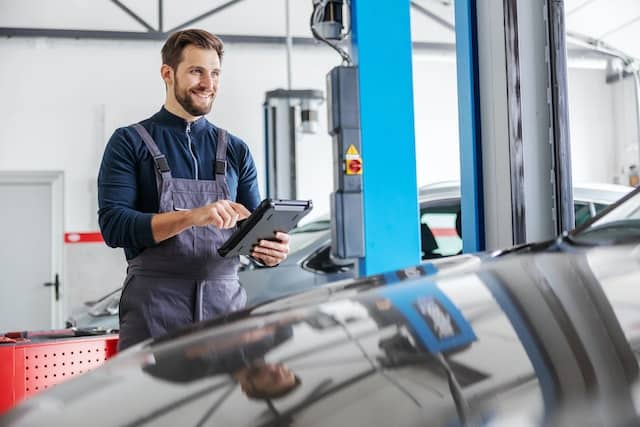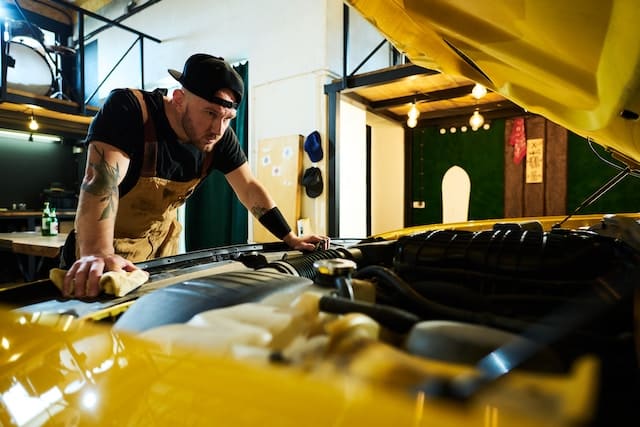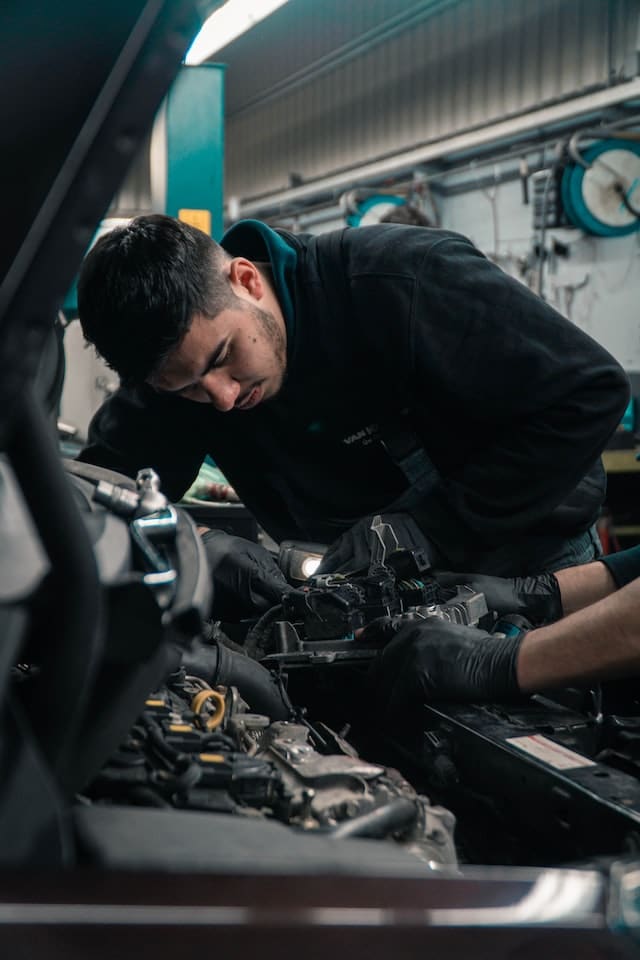
As a vehicle owner, knowing how to find a good mechanic is a critical skill. A good mechanic does more than just fix your car; they offer peace of mind and save you time and money in the long run. The primary considerations when looking for a good mechanic include seeking a shop that specializes in your car’s make, getting recommendations from trusted individuals, checking online reviews, reviewing Better Business Bureau ratings, verifying shop certifications, and identifying a mechanic with genuine passion for their job. Additionally, you should check if the shop offers warranties and don’t be afraid to ‘test’ shops with regular maintenance tasks. Importantly, good mechanics will explain the underlying issues with your car and help you learn along the way. Remember, finding the right mechanic involves more than a quick online search; it requires due diligence to establish a long-term relationship with a professional who understands and cares for your vehicle as much as you do.
How to Find the Best Vehicle Repair Shop?

Finding a good mechanic can be challenging, but there are several ways to ensure that you are working with a reputable and skilled professional. Here are a few tips to help you find a good mechanic:
Ask for recommendations
Ask friends, family, and co-workers if they have any recommendations for a good mechanic. They may have had a positive experience with someone they can recommend.
Check online reviews
Look up mechanics in your area on sites like Yelp, Google, and Angie’s List to see what others have said about their experiences.
Utilizing Google Maps and Reviews to Find a Reliable Mechanic
Looking for a reliable, local mechanic? Google has you covered. With its tools like Google Maps and Reviews, you can find a wealth of information to aid your search. Here’s how:
Start with Google Maps. Simply search for “Mechanics Near Me” or “Mechanics Near [City of your choice]”. You’ll be presented with a list, with the top results usually tagged with an ‘Ad’ symbol indicating paid advertisements. While these can be considered, they may not necessarily be the best or the closest options. To find organic results, scroll past these adverts.
The Google Maps summary page offers an abundance of useful details. It shows you the mechanic shop’s location relative to yours (provided you’ve enabled location services in your settings), its contact details, and even real-time data like its current crowd status and optimal visiting hours. The most valuable feature, however, is the customer ratings and reviews section.
Take the time to go through these reviews. They are often sorted by ‘newest’ first, providing a fresh perspective on the mechanic’s current service quality. Most reviews contain brief descriptions of customer experiences and are generally positive. Keep in mind, though, that negative reviews are inevitable as some people tend to highlight their bad experiences more than their good ones. As a rule of thumb, look for a business with a rating of four stars or higher.
Once you’ve located a good mechanic and experienced their service, don’t forget to share your experience. Leave a review on Google Maps – your insights will be invaluable to other vehicle owners in your community.
Check for certifications
Look for mechanics who are certified by organizations such as the National Institute for Automotive Service Excellence (ASE). These certifications indicate that a mechanic has passed a rigorous test and has the knowledge and skills to perform repairs correctly.
State Business License in Automotive Repair Shops
For an automotive repair shop to operate legally, certain states require them to be registered or licensed. The Federal Trade Commission strongly advises consumers to request proof of a shop’s current licenses before conducting business with them. This not only verifies their legitimacy but also offers an assurance of adherence to standard business regulations.
Moreover, some states possess dedicated departments to assist consumers in verifying an auto shop’s licenses and addressing any complaints. For instance, California has established the Bureau of Automotive Repair, a department specifically devoted to supporting investigations when consumers feel an auto shop hasn’t legally fulfilled the requirements concerning paid work.
Take a look at the Better Business Bureau
You can use the BBB to check the reputation of a mechanic or repair shop by searching for the business on the BBB website.
Ask about warranty and guarantees
A good mechanic should stand behind their work and offer a warranty or guarantee on parts and labor.
Visit the shop
Take a look at the shop and see if it is clean and well-organized. A well-maintained shop is a good indication that the mechanic takes pride in their work.
Communicate your concerns
A good mechanic will listen to your concerns, provide you with a clear explanation of the problem, and give you options for repairs.
Compare prices
Compare prices from different mechanics to ensure you are getting a fair price for the work to be done.
By following these tips, you can increase your chances of finding a good mechanic who will provide you with quality service at a fair price.
Exploring Auto Service Options

The choice of where to service your vehicle depends on various factors, such as cost, quality, and personal preference. Here’s a breakdown of different service options and their pros and cons.
Dealership Service Centers
Why You Might Choose Dealerships
Dealerships can cater to almost all your vehicle servicing needs. They offer convenience as a one-stop solution for any brand, despite the dealership’s affiliation. They subcontract work related to collision damage, detailing, and glass repair.
Why You Might Avoid Dealerships
However, dealership service centers tend to be more expensive due to overhead costs and their approach to repairs. They often adopt a ‘failure identification-replace part’ mentality. This method can be disadvantageous as it may not reveal the root cause of a problem, potentially leading to recurring issues. Moreover, dealerships often replace entire assemblies instead of repairing individual components, resulting in higher costs.
Another factor to consider is the dealership’s tendency to default to new, branded parts, which can be more expensive. For owners of older vehicles, less expensive aftermarket parts may be a better option.
Big Box Retailers: Walmart, Costco, and More
Why You Might Choose Big Box Retailers
These retailers offer competitive prices for common vehicle services and often have unmatched warranties and follow-up services.
Why You Might Avoid Big Box Retailers
The downside is the high staff turnover, making it difficult to establish a relationship with a specific mechanic. If a personal rapport with your mechanic is important to you, this might not be the best option.
Vehicle Repair Chains: Jiffy Lube, Meineke, and Midas
Why You Might Choose Repair Chains
Like big box stores, these chains offer a range of services, some even providing loaner cars.
Why You Might Avoid Repair Chains
However, their service quality can vary significantly depending on the local franchise’s management and staff. It’s essential to evaluate each location individually.
Local Independent Shops
Why You Might Choose Local Independent Shops
Many people prefer building long-lasting relationships with local shop staff, trusting them not to exploit or oversell unnecessary work. These shops offer more personalized service.
Why You Might Avoid Local Independent Shops
However, smaller shops might have longer wait times if they’re busy or the primary mechanic is unavailable. They may not offer all services, requiring you to visit multiple providers for different tasks.
Specialty Service Providers
These providers specialize in certain areas, such as battery and tire supply, collision damage, auto body shops, detailing, glass repair and replacement, and infotainment and audio services. It often takes multiple providers to keep a car in top condition.
Independent Local Shops for Special Brands
These shops specialize in servicing specific brands and may offer high-quality, cost-effective services due to their brand-specific knowledge and part sourcing. Social media clubs for specific car brands or models can be useful for finding these local mechanics.
How to Find a Good Mechanic? Steering Clear of Scams
Navigating the automotive repair world can be tricky, especially when trying to avoid scams. Here are some practical strategies to find a trustworthy mechanic.
Easy Accessibility and Communication
Locate and Contact
A trustworthy mechanic should be easily reachable, with their contact information readily available online or in a phone directory. If you leave a message expressing your interest in their services, expect a call back within a few hours.
Open Communication
A reputable mechanic should maintain open lines of communication, keeping you informed about your vehicle’s status while it’s in their care.
Transparent Cost Estimates
Ask for a Free Estimate
Most garages or auto body shops should offer a free assessment of any damage or issues with your vehicle and provide an estimate for the repairs.
Get it in Writing
Ensure this estimate is provided in writing. Without a written quote, you’re left vulnerable to inflated costs when it’s time to pick up your vehicle.
Professional First Impressions
Trust Your Instincts
When visiting a garage for the first time, use your common sense. It might be a bit messy, maybe without a formal receptionist, but you should be greeted by a courteous individual who can help you understand their services.
Documentation
Expect to sign a service plan or contract outlining your vehicle’s information and the estimated completion date. Make sure you receive a copy of this agreement before leaving.
Prompt Payments and Pick-ups
Complete Payments
Once the repair is complete, be ready to pay the full balance before collecting your car. While some mechanics may offer payment plans, most require full payment at the time of service.
Multiple Payment Options
Most reputable mechanics accept various payment methods, including credit cards.
Timely Completion of Work
Be Patient, But Assertive
Understand that parts might need to be ordered and the mechanic has to prioritize jobs. However, if your car has been at the shop for an extended period, and you’re not receiving honest updates, don’t hesitate to take your business elsewhere.
The Importance of Inspecting Essential Safety Components
A mechanic’s routine service or basic car maintenance should always involve a thorough examination of three crucial safety items: tires, brakes, and windshield wipers. Ensuring these components are in good shape can prevent accidents, save you from expensive repairs, and avoid unexpected breakdowns.
A simple way to assess your mechanic’s diligence is to see if they check these components during a routine service or tire rotation. This can give you a glimpse into their work ethic and help you decide if they are the right choice for more significant tasks, like a transmission service.
However, if your potential mechanic overlooks these essential safety checks, it might be a wise decision to continue your search for a more attentive auto repair professional.
A Reliable Mechanic as Your Cost Advocate
Not all repairs are economically sound, especially if your vehicle is older.
A trustworthy mechanic or auto repair shop will always consider the ratio of repair costs to the value of your car. If they inform you that the cost of a repair exceeds your car’s value, you’ve found a mechanic who’s looking out for your best interests!
On the other hand, if a mechanic recommends an expensive repair that surpasses your car’s worth without discussing other options, it’s time to seek a different professional.
Finding a good mechanic involves a combination of research, patience, and intuition. By following these tips, you’ll be better equipped to avoid scams and ensure your vehicle gets the care it needs.
Find A Shop For Your Brand Of Car

There are several ways to find a shop that specializes in your brand of car. Here are a few options to consider:
Dealer
Visit the dealership where you purchased your car or a dealership that sells the same brand of car. They will have the knowledge, skills, and equipment needed to properly service your car and have access to the latest software and updates.
Brand-specific shops
Look for shops that specialize in your brand of car. They will have experience and expertise in working on that specific make and model.
Online search
You can search online for shops that specialize in your brand of car.
Ask for recommendations
Ask friends, family, or coworkers if they have any recommendations for a shop that specializes in your brand of car. They may have had a positive experience with a shop they can recommend.
Car club
Join a car club that is dedicated to your brand of car. Many of these clubs have a list of recommended mechanics that specialize in working on that specific make and model.
By taking into consideration the above options, you increase the chances of finding a shop that has the knowledge and experience to service your brand of car properly.
How To Find A Good Mechanic? Frequently Asked Questions

What is the importance of choosing a mechanic that specializes in my car’s make?
A mechanic that specializes in your car’s make has more expertise and experience in dealing with the specific intricacies of that type of car, leading to more efficient and effective service.
How reliable are online reviews when looking for a good mechanic?
Online reviews are generally reliable indicators of a mechanic’s service quality. They give a sense of the experiences of past customers, but remember to read them critically and look for recurring themes.
What is the BBB and how can it help me find a good mechanic?
The Better Business Bureau (BBB) is a nonprofit organization that rates businesses on their trustworthiness. It can be a valuable tool when looking for a reputable mechanic shop.
Why is certification important for a mechanic?
Certifications, like those from the National Institute for Automotive Service Excellence (ASE), signify that a mechanic has achieved a certain level of professional qualification and adheres to industry standards.
Why should I care if a mechanic is passionate about their job?
A passionate mechanic is more likely to take a thorough, dedicated approach to their work. They’ll go beyond just fixing the immediate problem and will look for any subtle signs of potential issues, potentially saving you from future car troubles.
How can I check if a mechanic shop offers warranties?
You can directly ask the shop about their warranty policies or look for this information on their website. Warranties provide an added layer of protection for your repairs.
Why should I ‘experiment’ with shops using maintenance tasks?
Regular maintenance tasks provide an opportunity to assess a shop’s service quality, professionalism, and customer service without risking a major repair.
Why is it important for a mechanic to explain the underlying issues with my car?
Understanding the root causes of issues with your vehicle helps you make informed decisions about repairs, prevent future problems, and better understand what you’re paying for.
Q: Why might I choose to service my vehicle at a dealership?
A: Dealerships offer the convenience of a one-stop solution for any vehicle brand. They subcontract work related to collision damage, detailing, and glass repair, making them able to handle a wide range of vehicle-related issues.
Q: Why might I avoid dealership service centers?
A: Dealerships tend to be more expensive due to their overhead costs and their ‘failure identification-replace part’ approach to repairs. This approach may not reveal the root cause of a problem, potentially leading to recurring issues. Dealerships also tend to replace entire assemblies instead of repairing individual components, which can further increase costs.
Q: What are the advantages and disadvantages of servicing my vehicle at big box retailers like Walmart and Costco?
A: Big box retailers offer competitive prices for common vehicle services and often have unmatched warranties and follow-up services. However, they have a high staff turnover rate, which could prevent you from establishing a relationship with a specific mechanic.
Q: What should I consider when choosing vehicle repair chains like Jiffy Lube, Meineke, and Midas?
A: These chains offer a range of services, with some even providing loaner cars. However, the quality of service can vary significantly depending on the local franchise’s management and staff, so it’s important to evaluate each location individually.
Q: Why might I choose to service my vehicle at a local independent shop?
A: Many people prefer to build long-lasting relationships with local shop staff, trusting them not to exploit or oversell unnecessary work. These shops can offer a more personalized service.
Q: What are some downsides of choosing a local independent shop?
A: Smaller shops might have longer wait times if they’re busy or the primary mechanic is unavailable. They may not offer all services, which might require you to visit multiple providers for different tasks.
Q: What are specialty service providers?
A: Specialty service providers focus on certain areas, such as battery and tire supply, collision damage, auto body shops, detailing, glass repair and replacement, and infotainment and audio services. It often takes multiple providers to keep a car in top condition.
Q: What are independent local shops for special brands?
A: These shops specialize in servicing specific brands. Due to their brand-specific knowledge and ability to source parts effectively, they may provide high-quality, cost-effective services. Social media clubs for specific car brands or models can be useful for finding these local mechanics.
Q: How can I tell if a mechanic is trustworthy?
A: A trustworthy mechanic will be easily accessible, with readily available contact information. They should respond quickly if you leave a message. Additionally, they should maintain open lines of communication and keep you informed about your vehicle’s status while it’s in their care.
Q: What should I expect when I ask for a repair estimate?
A: Most garages or auto body shops should provide a free assessment of any damage or issues with your vehicle, along with an estimate for the repairs. This estimate should always be provided in writing to avoid any potential disputes regarding inflated costs later on.
Q: What should I look out for on my first visit to a garage?
A: During your initial visit to a garage, use your common sense. It might be a bit messy, but you should be greeted by a polite individual who is ready to help. You should also expect to sign a service plan or contract that details your vehicle’s information and an estimated completion date.
Q: What are the usual payment terms when getting a vehicle repaired?
A: Once the repair is complete, you should be prepared to pay the full balance before collecting your vehicle. Most mechanics require complete payment at the time of service. Reputable mechanics usually accept various forms of payment, including credit cards.
Q: How long should I wait for my vehicle to be repaired?
A: While it’s important to understand that parts might need to be ordered and jobs have to be prioritized, your vehicle shouldn’t be at the shop for an excessively long period. If your vehicle has been at the shop for weeks and you’re not receiving honest updates, it might be best to take your business elsewhere.
Q: How can I tell if a mechanic is diligent about checking safety components?
A: You can gauge a mechanic’s diligence by observing whether they inspect the tires, brakes, and wipers during routine maintenance or a tire rotation.
Q: What should a good mechanic consider when evaluating the cost of a repair?
A: A good mechanic or auto repair shop should always weigh the cost of a repair against your car’s worth. If the repair cost exceeds the car’s value, a trustworthy mechanic will inform you about this.


